Employability Skills Report: National Trust and Skill Development
VerifiedAdded on 2023/01/23
|13
|4116
|86
Report
AI Summary
This report analyzes employability skills crucial for a Membership and visitor welcome manager at the National Trust. It begins with a self-assessment of responsibilities and performance objectives, including decision-making, employment rights, and adaptability. The report evaluates skill gaps and recommends improvement strategies such as training, observation, and self-learning, alongside motivational techniques like rewards and performance appraisals. It then explores team dynamics, explaining roles within a team and how they work together to achieve shared goals, analyzing team dynamics and suggesting alternative approaches to tasks. Finally, the report addresses problem-solving, evaluating tools and methods to resolve issues like labor turnover, and assessing the potential impact of implementing the proposed strategies. The report highlights the importance of continuous skill development and effective teamwork in achieving organizational objectives.
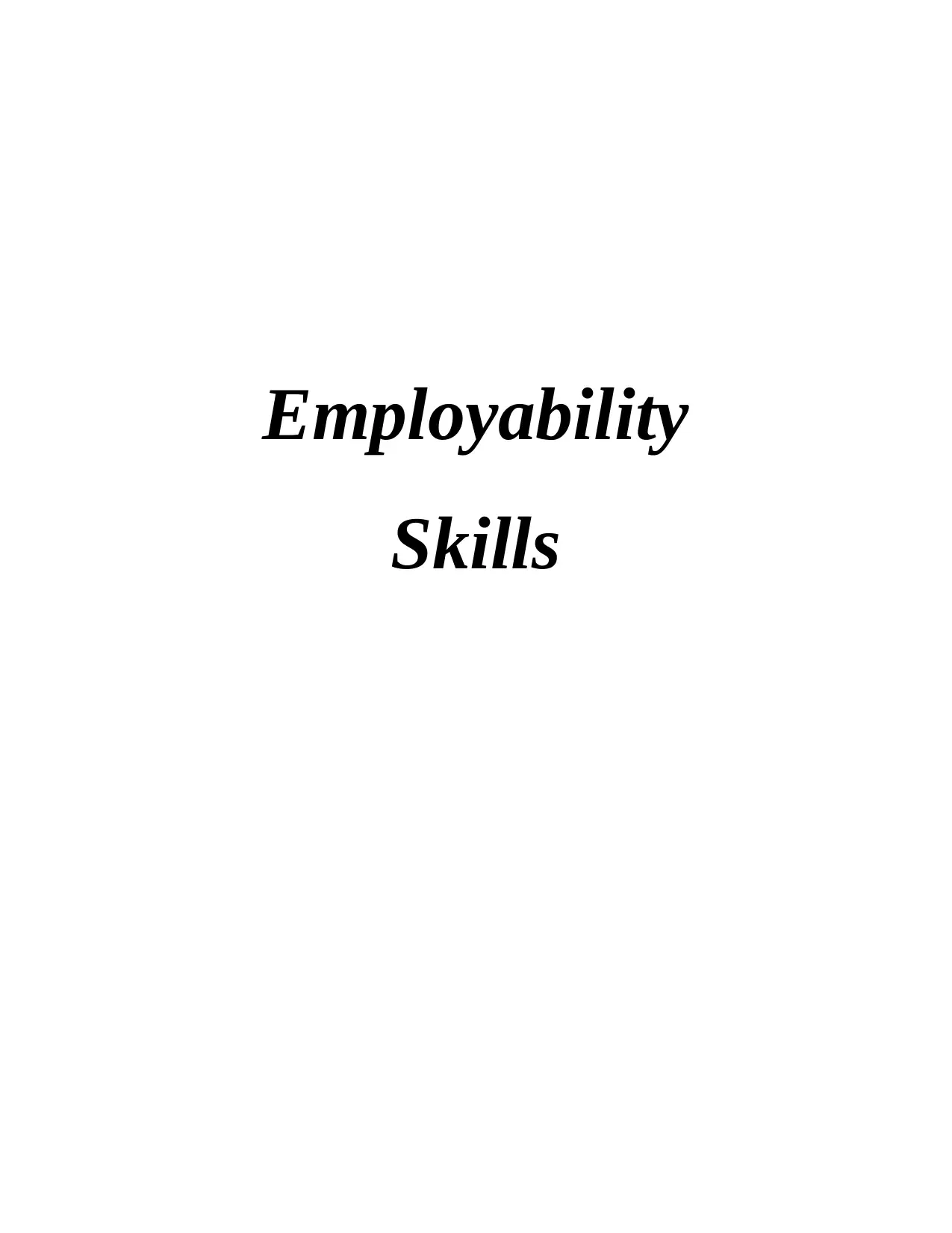
Employability
Skills
Skills
Paraphrase This Document
Need a fresh take? Get an instant paraphrase of this document with our AI Paraphraser
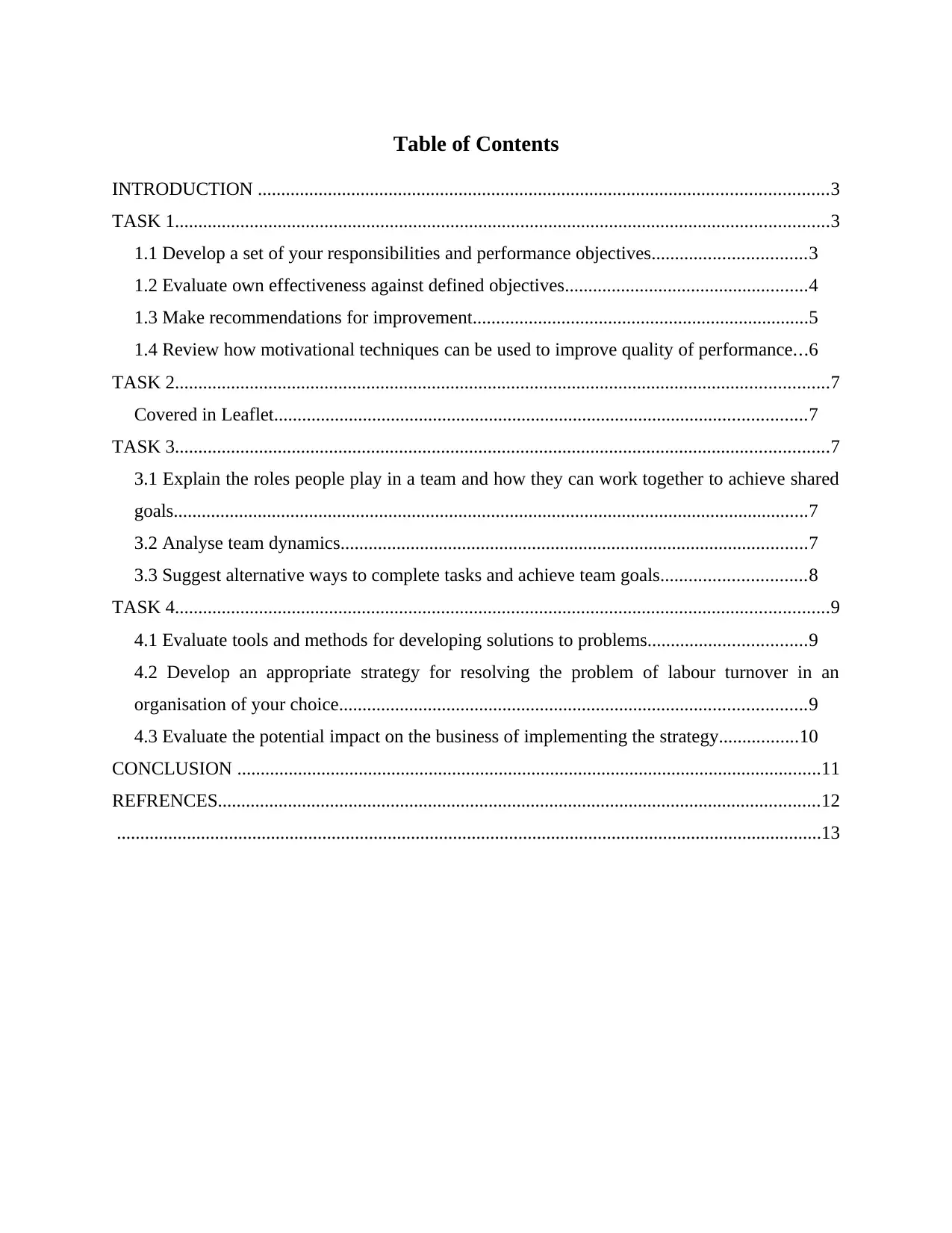
Table of Contents
INTRODUCTION ..........................................................................................................................3
TASK 1............................................................................................................................................3
1.1 Develop a set of your responsibilities and performance objectives.................................3
1.2 Evaluate own effectiveness against defined objectives....................................................4
1.3 Make recommendations for improvement........................................................................5
1.4 Review how motivational techniques can be used to improve quality of performance...6
TASK 2............................................................................................................................................7
Covered in Leaflet..................................................................................................................7
TASK 3............................................................................................................................................7
3.1 Explain the roles people play in a team and how they can work together to achieve shared
goals........................................................................................................................................7
3.2 Analyse team dynamics....................................................................................................7
3.3 Suggest alternative ways to complete tasks and achieve team goals...............................8
TASK 4............................................................................................................................................9
4.1 Evaluate tools and methods for developing solutions to problems..................................9
4.2 Develop an appropriate strategy for resolving the problem of labour turnover in an
organisation of your choice....................................................................................................9
4.3 Evaluate the potential impact on the business of implementing the strategy.................10
CONCLUSION .............................................................................................................................11
REFRENCES.................................................................................................................................12
.......................................................................................................................................................13
INTRODUCTION ..........................................................................................................................3
TASK 1............................................................................................................................................3
1.1 Develop a set of your responsibilities and performance objectives.................................3
1.2 Evaluate own effectiveness against defined objectives....................................................4
1.3 Make recommendations for improvement........................................................................5
1.4 Review how motivational techniques can be used to improve quality of performance...6
TASK 2............................................................................................................................................7
Covered in Leaflet..................................................................................................................7
TASK 3............................................................................................................................................7
3.1 Explain the roles people play in a team and how they can work together to achieve shared
goals........................................................................................................................................7
3.2 Analyse team dynamics....................................................................................................7
3.3 Suggest alternative ways to complete tasks and achieve team goals...............................8
TASK 4............................................................................................................................................9
4.1 Evaluate tools and methods for developing solutions to problems..................................9
4.2 Develop an appropriate strategy for resolving the problem of labour turnover in an
organisation of your choice....................................................................................................9
4.3 Evaluate the potential impact on the business of implementing the strategy.................10
CONCLUSION .............................................................................................................................11
REFRENCES.................................................................................................................................12
.......................................................................................................................................................13
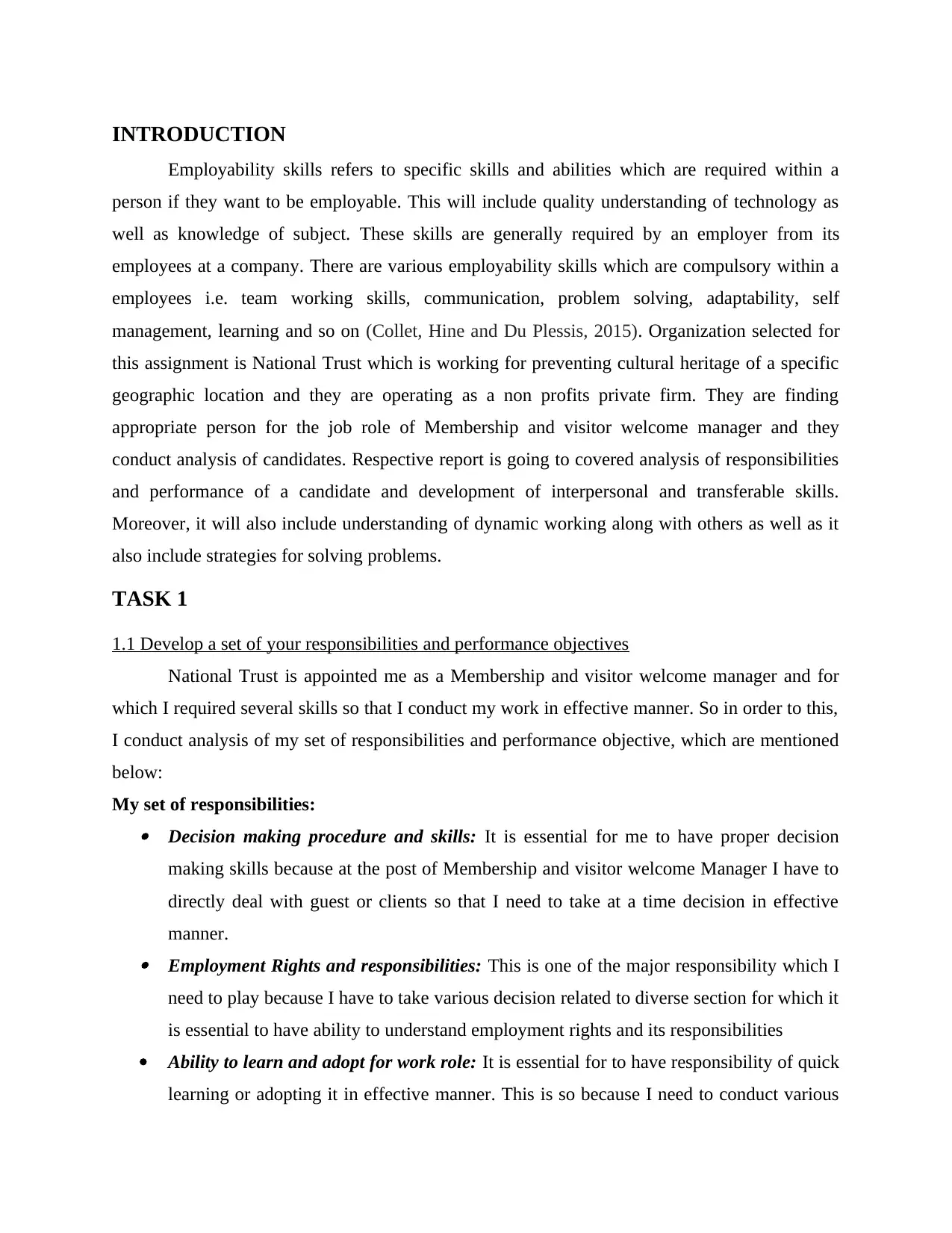
INTRODUCTION
Employability skills refers to specific skills and abilities which are required within a
person if they want to be employable. This will include quality understanding of technology as
well as knowledge of subject. These skills are generally required by an employer from its
employees at a company. There are various employability skills which are compulsory within a
employees i.e. team working skills, communication, problem solving, adaptability, self
management, learning and so on (Collet, Hine and Du Plessis, 2015). Organization selected for
this assignment is National Trust which is working for preventing cultural heritage of a specific
geographic location and they are operating as a non profits private firm. They are finding
appropriate person for the job role of Membership and visitor welcome manager and they
conduct analysis of candidates. Respective report is going to covered analysis of responsibilities
and performance of a candidate and development of interpersonal and transferable skills.
Moreover, it will also include understanding of dynamic working along with others as well as it
also include strategies for solving problems.
TASK 1
1.1 Develop a set of your responsibilities and performance objectives
National Trust is appointed me as a Membership and visitor welcome manager and for
which I required several skills so that I conduct my work in effective manner. So in order to this,
I conduct analysis of my set of responsibilities and performance objective, which are mentioned
below:
My set of responsibilities: Decision making procedure and skills: It is essential for me to have proper decision
making skills because at the post of Membership and visitor welcome Manager I have to
directly deal with guest or clients so that I need to take at a time decision in effective
manner. Employment Rights and responsibilities: This is one of the major responsibility which I
need to play because I have to take various decision related to diverse section for which it
is essential to have ability to understand employment rights and its responsibilities
Ability to learn and adopt for work role: It is essential for to have responsibility of quick
learning or adopting it in effective manner. This is so because I need to conduct various
Employability skills refers to specific skills and abilities which are required within a
person if they want to be employable. This will include quality understanding of technology as
well as knowledge of subject. These skills are generally required by an employer from its
employees at a company. There are various employability skills which are compulsory within a
employees i.e. team working skills, communication, problem solving, adaptability, self
management, learning and so on (Collet, Hine and Du Plessis, 2015). Organization selected for
this assignment is National Trust which is working for preventing cultural heritage of a specific
geographic location and they are operating as a non profits private firm. They are finding
appropriate person for the job role of Membership and visitor welcome manager and they
conduct analysis of candidates. Respective report is going to covered analysis of responsibilities
and performance of a candidate and development of interpersonal and transferable skills.
Moreover, it will also include understanding of dynamic working along with others as well as it
also include strategies for solving problems.
TASK 1
1.1 Develop a set of your responsibilities and performance objectives
National Trust is appointed me as a Membership and visitor welcome manager and for
which I required several skills so that I conduct my work in effective manner. So in order to this,
I conduct analysis of my set of responsibilities and performance objective, which are mentioned
below:
My set of responsibilities: Decision making procedure and skills: It is essential for me to have proper decision
making skills because at the post of Membership and visitor welcome Manager I have to
directly deal with guest or clients so that I need to take at a time decision in effective
manner. Employment Rights and responsibilities: This is one of the major responsibility which I
need to play because I have to take various decision related to diverse section for which it
is essential to have ability to understand employment rights and its responsibilities
Ability to learn and adopt for work role: It is essential for to have responsibility of quick
learning or adopting it in effective manner. This is so because I need to conduct various
⊘ This is a preview!⊘
Do you want full access?
Subscribe today to unlock all pages.

Trusted by 1+ million students worldwide
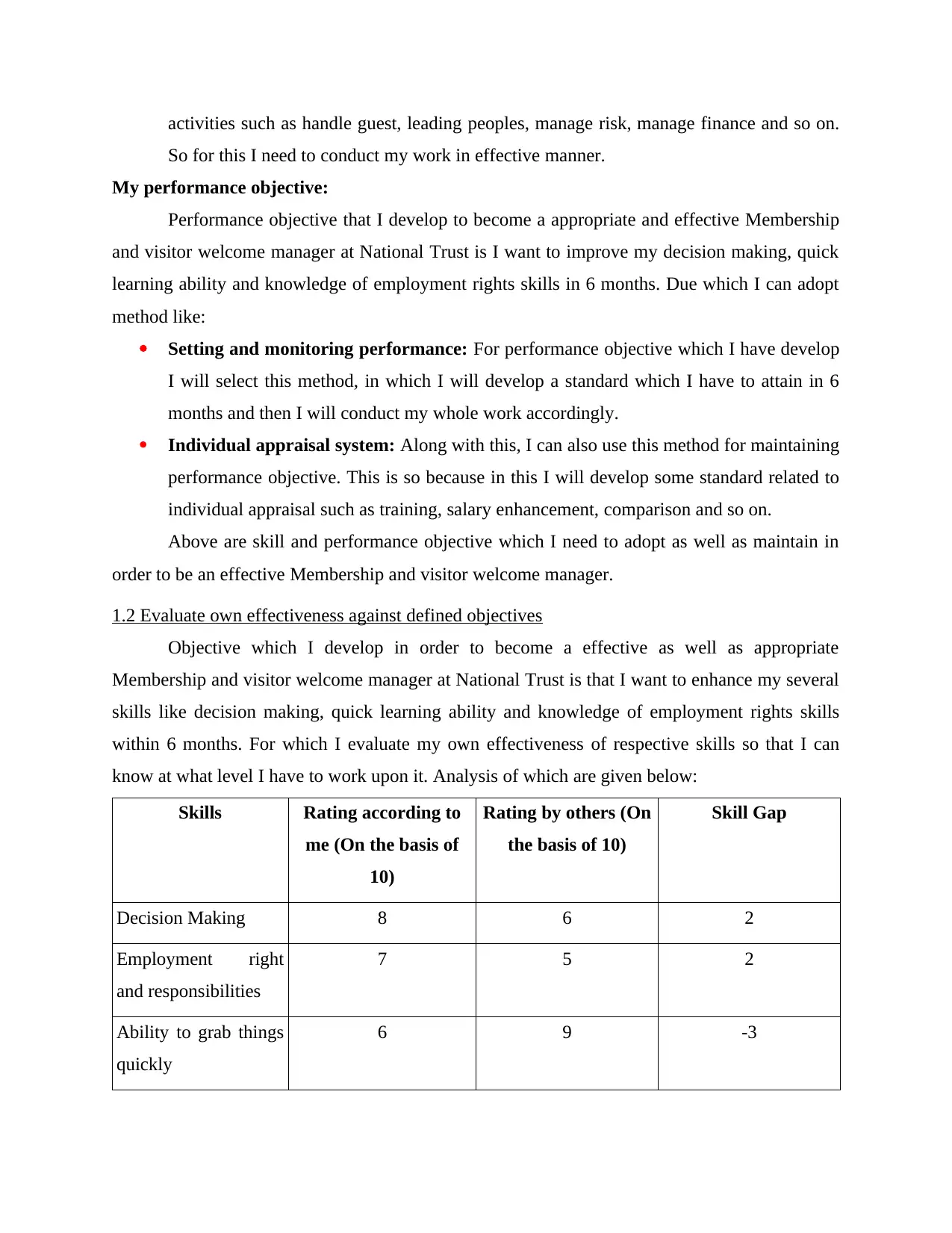
activities such as handle guest, leading peoples, manage risk, manage finance and so on.
So for this I need to conduct my work in effective manner.
My performance objective:
Performance objective that I develop to become a appropriate and effective Membership
and visitor welcome manager at National Trust is I want to improve my decision making, quick
learning ability and knowledge of employment rights skills in 6 months. Due which I can adopt
method like:
Setting and monitoring performance: For performance objective which I have develop
I will select this method, in which I will develop a standard which I have to attain in 6
months and then I will conduct my whole work accordingly.
Individual appraisal system: Along with this, I can also use this method for maintaining
performance objective. This is so because in this I will develop some standard related to
individual appraisal such as training, salary enhancement, comparison and so on.
Above are skill and performance objective which I need to adopt as well as maintain in
order to be an effective Membership and visitor welcome manager.
1.2 Evaluate own effectiveness against defined objectives
Objective which I develop in order to become a effective as well as appropriate
Membership and visitor welcome manager at National Trust is that I want to enhance my several
skills like decision making, quick learning ability and knowledge of employment rights skills
within 6 months. For which I evaluate my own effectiveness of respective skills so that I can
know at what level I have to work upon it. Analysis of which are given below:
Skills Rating according to
me (On the basis of
10)
Rating by others (On
the basis of 10)
Skill Gap
Decision Making 8 6 2
Employment right
and responsibilities
7 5 2
Ability to grab things
quickly
6 9 -3
So for this I need to conduct my work in effective manner.
My performance objective:
Performance objective that I develop to become a appropriate and effective Membership
and visitor welcome manager at National Trust is I want to improve my decision making, quick
learning ability and knowledge of employment rights skills in 6 months. Due which I can adopt
method like:
Setting and monitoring performance: For performance objective which I have develop
I will select this method, in which I will develop a standard which I have to attain in 6
months and then I will conduct my whole work accordingly.
Individual appraisal system: Along with this, I can also use this method for maintaining
performance objective. This is so because in this I will develop some standard related to
individual appraisal such as training, salary enhancement, comparison and so on.
Above are skill and performance objective which I need to adopt as well as maintain in
order to be an effective Membership and visitor welcome manager.
1.2 Evaluate own effectiveness against defined objectives
Objective which I develop in order to become a effective as well as appropriate
Membership and visitor welcome manager at National Trust is that I want to enhance my several
skills like decision making, quick learning ability and knowledge of employment rights skills
within 6 months. For which I evaluate my own effectiveness of respective skills so that I can
know at what level I have to work upon it. Analysis of which are given below:
Skills Rating according to
me (On the basis of
10)
Rating by others (On
the basis of 10)
Skill Gap
Decision Making 8 6 2
Employment right
and responsibilities
7 5 2
Ability to grab things
quickly
6 9 -3
Paraphrase This Document
Need a fresh take? Get an instant paraphrase of this document with our AI Paraphraser
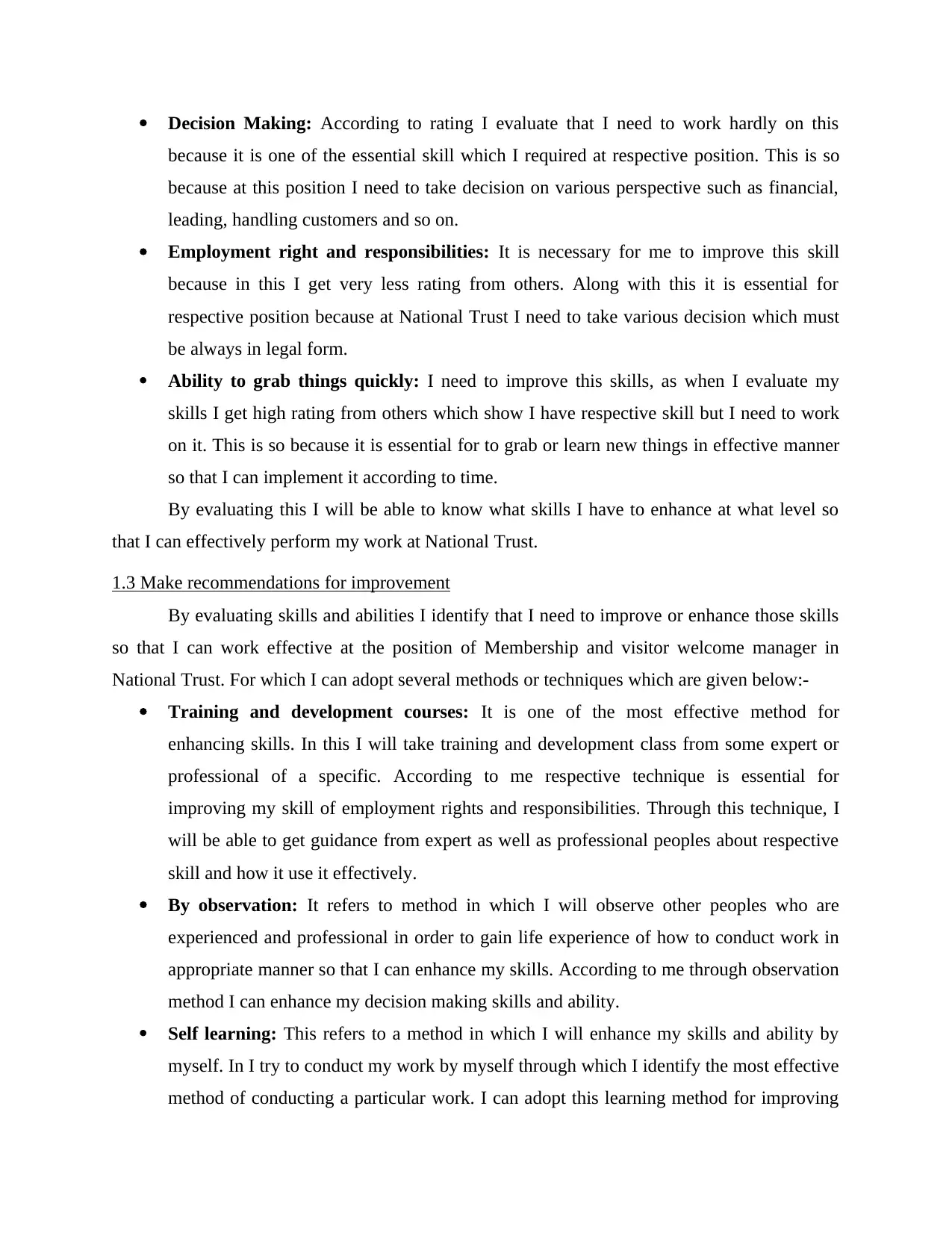
Decision Making: According to rating I evaluate that I need to work hardly on this
because it is one of the essential skill which I required at respective position. This is so
because at this position I need to take decision on various perspective such as financial,
leading, handling customers and so on.
Employment right and responsibilities: It is necessary for me to improve this skill
because in this I get very less rating from others. Along with this it is essential for
respective position because at National Trust I need to take various decision which must
be always in legal form.
Ability to grab things quickly: I need to improve this skills, as when I evaluate my
skills I get high rating from others which show I have respective skill but I need to work
on it. This is so because it is essential for to grab or learn new things in effective manner
so that I can implement it according to time.
By evaluating this I will be able to know what skills I have to enhance at what level so
that I can effectively perform my work at National Trust.
1.3 Make recommendations for improvement
By evaluating skills and abilities I identify that I need to improve or enhance those skills
so that I can work effective at the position of Membership and visitor welcome manager in
National Trust. For which I can adopt several methods or techniques which are given below:-
Training and development courses: It is one of the most effective method for
enhancing skills. In this I will take training and development class from some expert or
professional of a specific. According to me respective technique is essential for
improving my skill of employment rights and responsibilities. Through this technique, I
will be able to get guidance from expert as well as professional peoples about respective
skill and how it use it effectively.
By observation: It refers to method in which I will observe other peoples who are
experienced and professional in order to gain life experience of how to conduct work in
appropriate manner so that I can enhance my skills. According to me through observation
method I can enhance my decision making skills and ability.
Self learning: This refers to a method in which I will enhance my skills and ability by
myself. In I try to conduct my work by myself through which I identify the most effective
method of conducting a particular work. I can adopt this learning method for improving
because it is one of the essential skill which I required at respective position. This is so
because at this position I need to take decision on various perspective such as financial,
leading, handling customers and so on.
Employment right and responsibilities: It is necessary for me to improve this skill
because in this I get very less rating from others. Along with this it is essential for
respective position because at National Trust I need to take various decision which must
be always in legal form.
Ability to grab things quickly: I need to improve this skills, as when I evaluate my
skills I get high rating from others which show I have respective skill but I need to work
on it. This is so because it is essential for to grab or learn new things in effective manner
so that I can implement it according to time.
By evaluating this I will be able to know what skills I have to enhance at what level so
that I can effectively perform my work at National Trust.
1.3 Make recommendations for improvement
By evaluating skills and abilities I identify that I need to improve or enhance those skills
so that I can work effective at the position of Membership and visitor welcome manager in
National Trust. For which I can adopt several methods or techniques which are given below:-
Training and development courses: It is one of the most effective method for
enhancing skills. In this I will take training and development class from some expert or
professional of a specific. According to me respective technique is essential for
improving my skill of employment rights and responsibilities. Through this technique, I
will be able to get guidance from expert as well as professional peoples about respective
skill and how it use it effectively.
By observation: It refers to method in which I will observe other peoples who are
experienced and professional in order to gain life experience of how to conduct work in
appropriate manner so that I can enhance my skills. According to me through observation
method I can enhance my decision making skills and ability.
Self learning: This refers to a method in which I will enhance my skills and ability by
myself. In I try to conduct my work by myself through which I identify the most effective
method of conducting a particular work. I can adopt this learning method for improving
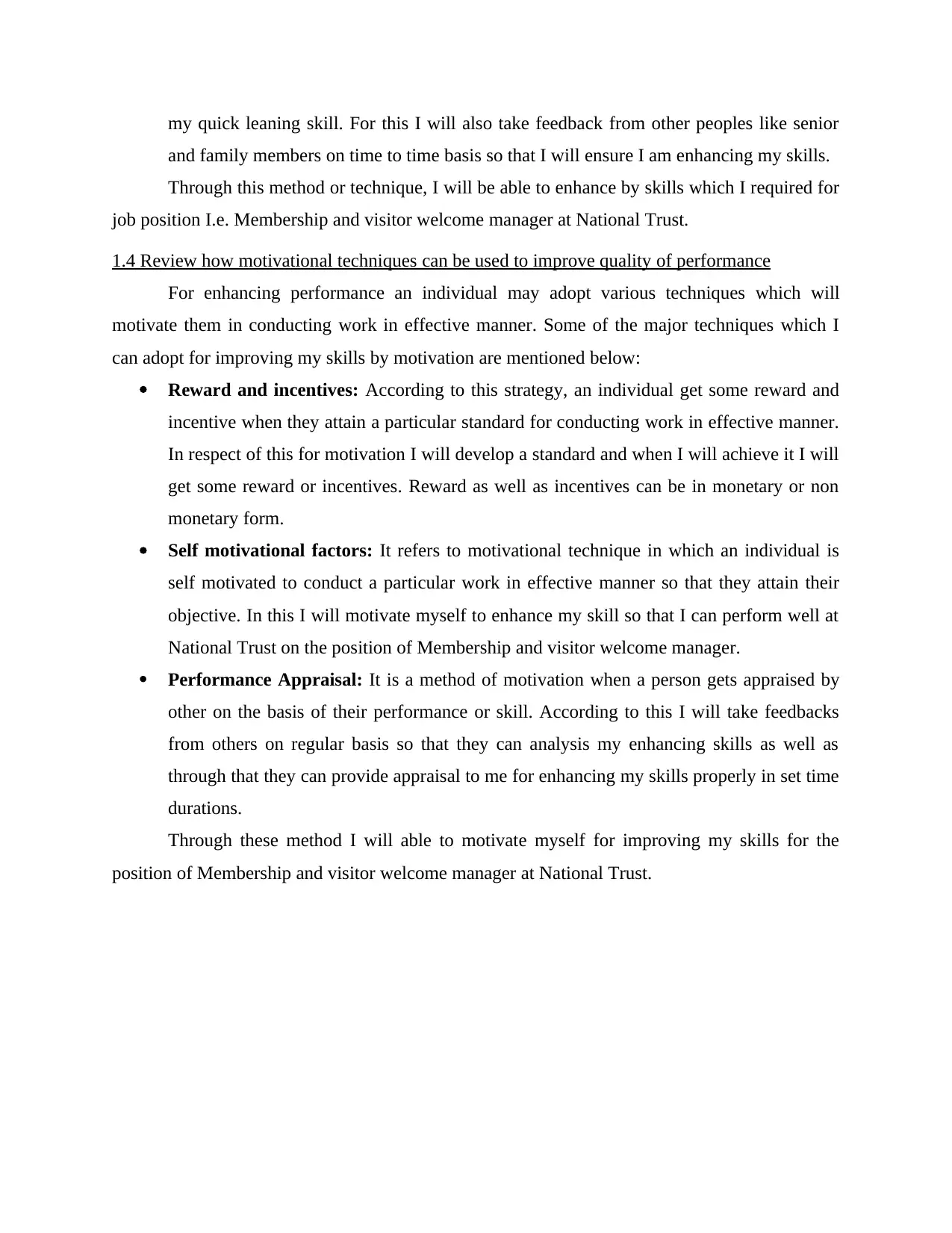
my quick leaning skill. For this I will also take feedback from other peoples like senior
and family members on time to time basis so that I will ensure I am enhancing my skills.
Through this method or technique, I will be able to enhance by skills which I required for
job position I.e. Membership and visitor welcome manager at National Trust.
1.4 Review how motivational techniques can be used to improve quality of performance
For enhancing performance an individual may adopt various techniques which will
motivate them in conducting work in effective manner. Some of the major techniques which I
can adopt for improving my skills by motivation are mentioned below:
Reward and incentives: According to this strategy, an individual get some reward and
incentive when they attain a particular standard for conducting work in effective manner.
In respect of this for motivation I will develop a standard and when I will achieve it I will
get some reward or incentives. Reward as well as incentives can be in monetary or non
monetary form.
Self motivational factors: It refers to motivational technique in which an individual is
self motivated to conduct a particular work in effective manner so that they attain their
objective. In this I will motivate myself to enhance my skill so that I can perform well at
National Trust on the position of Membership and visitor welcome manager.
Performance Appraisal: It is a method of motivation when a person gets appraised by
other on the basis of their performance or skill. According to this I will take feedbacks
from others on regular basis so that they can analysis my enhancing skills as well as
through that they can provide appraisal to me for enhancing my skills properly in set time
durations.
Through these method I will able to motivate myself for improving my skills for the
position of Membership and visitor welcome manager at National Trust.
and family members on time to time basis so that I will ensure I am enhancing my skills.
Through this method or technique, I will be able to enhance by skills which I required for
job position I.e. Membership and visitor welcome manager at National Trust.
1.4 Review how motivational techniques can be used to improve quality of performance
For enhancing performance an individual may adopt various techniques which will
motivate them in conducting work in effective manner. Some of the major techniques which I
can adopt for improving my skills by motivation are mentioned below:
Reward and incentives: According to this strategy, an individual get some reward and
incentive when they attain a particular standard for conducting work in effective manner.
In respect of this for motivation I will develop a standard and when I will achieve it I will
get some reward or incentives. Reward as well as incentives can be in monetary or non
monetary form.
Self motivational factors: It refers to motivational technique in which an individual is
self motivated to conduct a particular work in effective manner so that they attain their
objective. In this I will motivate myself to enhance my skill so that I can perform well at
National Trust on the position of Membership and visitor welcome manager.
Performance Appraisal: It is a method of motivation when a person gets appraised by
other on the basis of their performance or skill. According to this I will take feedbacks
from others on regular basis so that they can analysis my enhancing skills as well as
through that they can provide appraisal to me for enhancing my skills properly in set time
durations.
Through these method I will able to motivate myself for improving my skills for the
position of Membership and visitor welcome manager at National Trust.
⊘ This is a preview!⊘
Do you want full access?
Subscribe today to unlock all pages.

Trusted by 1+ million students worldwide
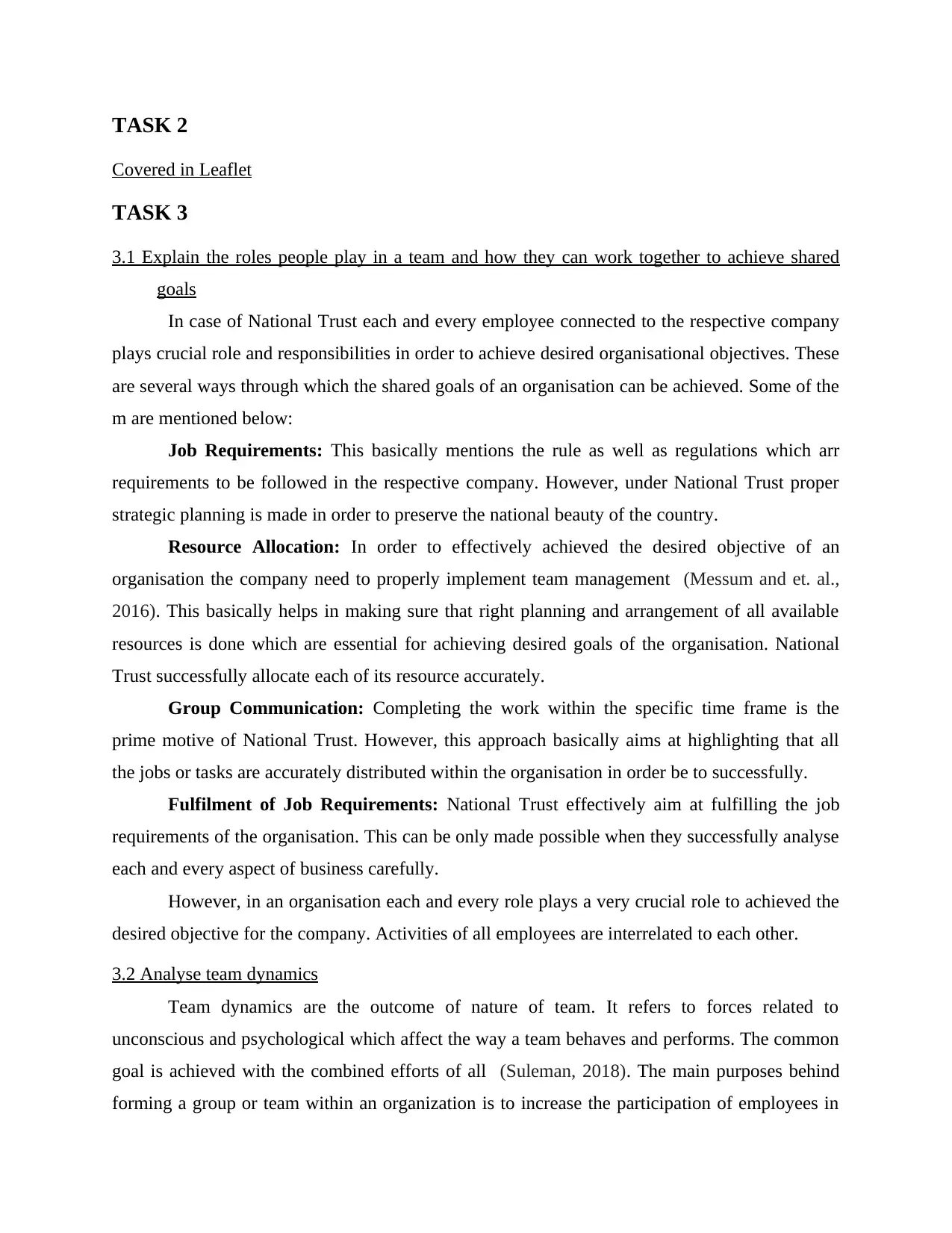
TASK 2
Covered in Leaflet
TASK 3
3.1 Explain the roles people play in a team and how they can work together to achieve shared
goals
In case of National Trust each and every employee connected to the respective company
plays crucial role and responsibilities in order to achieve desired organisational objectives. These
are several ways through which the shared goals of an organisation can be achieved. Some of the
m are mentioned below:
Job Requirements: This basically mentions the rule as well as regulations which arr
requirements to be followed in the respective company. However, under National Trust proper
strategic planning is made in order to preserve the national beauty of the country.
Resource Allocation: In order to effectively achieved the desired objective of an
organisation the company need to properly implement team management (Messum and et. al.,
2016). This basically helps in making sure that right planning and arrangement of all available
resources is done which are essential for achieving desired goals of the organisation. National
Trust successfully allocate each of its resource accurately.
Group Communication: Completing the work within the specific time frame is the
prime motive of National Trust. However, this approach basically aims at highlighting that all
the jobs or tasks are accurately distributed within the organisation in order be to successfully.
Fulfilment of Job Requirements: National Trust effectively aim at fulfilling the job
requirements of the organisation. This can be only made possible when they successfully analyse
each and every aspect of business carefully.
However, in an organisation each and every role plays a very crucial role to achieved the
desired objective for the company. Activities of all employees are interrelated to each other.
3.2 Analyse team dynamics
Team dynamics are the outcome of nature of team. It refers to forces related to
unconscious and psychological which affect the way a team behaves and performs. The common
goal is achieved with the combined efforts of all (Suleman, 2018). The main purposes behind
forming a group or team within an organization is to increase the participation of employees in
Covered in Leaflet
TASK 3
3.1 Explain the roles people play in a team and how they can work together to achieve shared
goals
In case of National Trust each and every employee connected to the respective company
plays crucial role and responsibilities in order to achieve desired organisational objectives. These
are several ways through which the shared goals of an organisation can be achieved. Some of the
m are mentioned below:
Job Requirements: This basically mentions the rule as well as regulations which arr
requirements to be followed in the respective company. However, under National Trust proper
strategic planning is made in order to preserve the national beauty of the country.
Resource Allocation: In order to effectively achieved the desired objective of an
organisation the company need to properly implement team management (Messum and et. al.,
2016). This basically helps in making sure that right planning and arrangement of all available
resources is done which are essential for achieving desired goals of the organisation. National
Trust successfully allocate each of its resource accurately.
Group Communication: Completing the work within the specific time frame is the
prime motive of National Trust. However, this approach basically aims at highlighting that all
the jobs or tasks are accurately distributed within the organisation in order be to successfully.
Fulfilment of Job Requirements: National Trust effectively aim at fulfilling the job
requirements of the organisation. This can be only made possible when they successfully analyse
each and every aspect of business carefully.
However, in an organisation each and every role plays a very crucial role to achieved the
desired objective for the company. Activities of all employees are interrelated to each other.
3.2 Analyse team dynamics
Team dynamics are the outcome of nature of team. It refers to forces related to
unconscious and psychological which affect the way a team behaves and performs. The common
goal is achieved with the combined efforts of all (Suleman, 2018). The main purposes behind
forming a group or team within an organization is to increase the participation of employees in
Paraphrase This Document
Need a fresh take? Get an instant paraphrase of this document with our AI Paraphraser
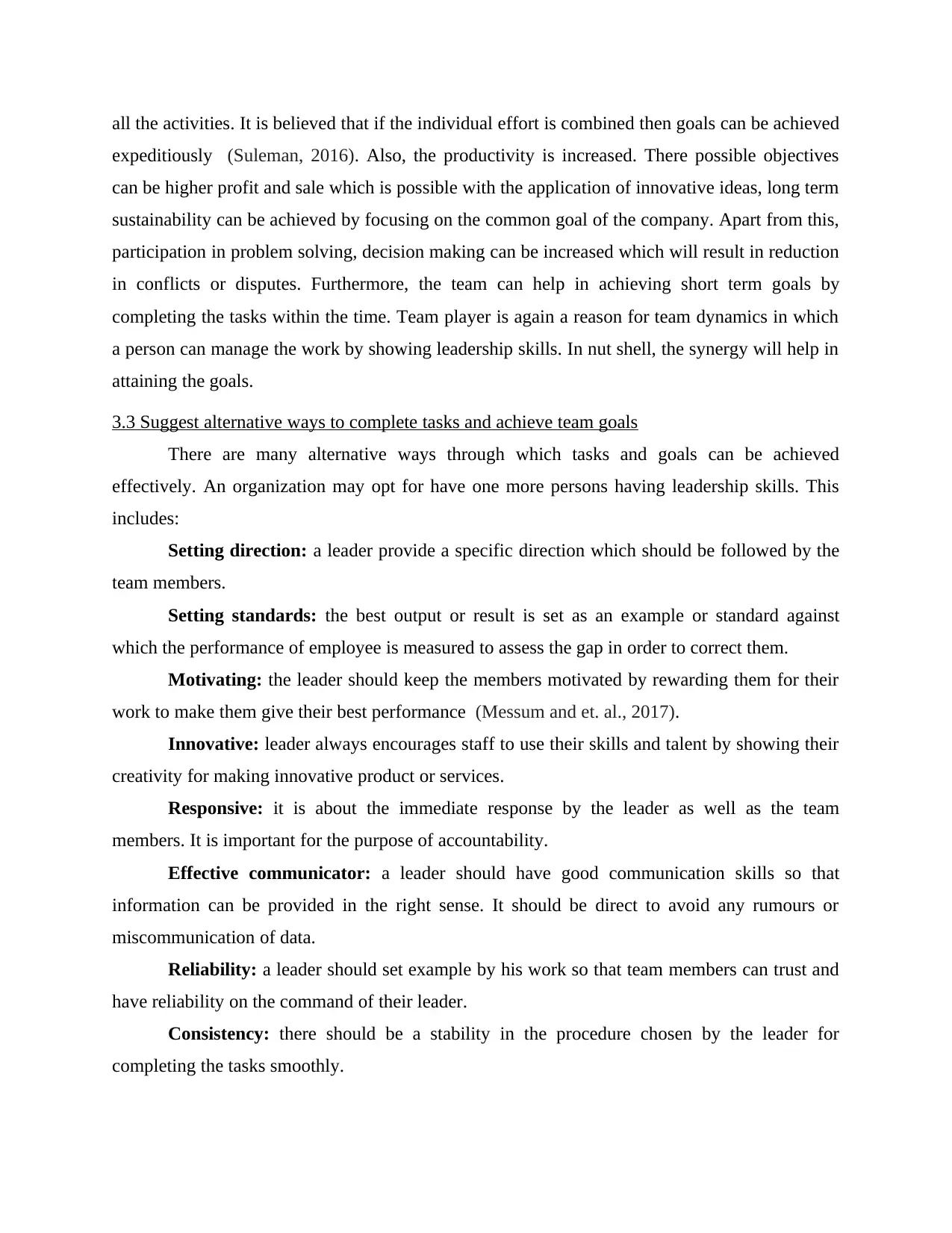
all the activities. It is believed that if the individual effort is combined then goals can be achieved
expeditiously (Suleman, 2016). Also, the productivity is increased. There possible objectives
can be higher profit and sale which is possible with the application of innovative ideas, long term
sustainability can be achieved by focusing on the common goal of the company. Apart from this,
participation in problem solving, decision making can be increased which will result in reduction
in conflicts or disputes. Furthermore, the team can help in achieving short term goals by
completing the tasks within the time. Team player is again a reason for team dynamics in which
a person can manage the work by showing leadership skills. In nut shell, the synergy will help in
attaining the goals.
3.3 Suggest alternative ways to complete tasks and achieve team goals
There are many alternative ways through which tasks and goals can be achieved
effectively. An organization may opt for have one more persons having leadership skills. This
includes:
Setting direction: a leader provide a specific direction which should be followed by the
team members.
Setting standards: the best output or result is set as an example or standard against
which the performance of employee is measured to assess the gap in order to correct them.
Motivating: the leader should keep the members motivated by rewarding them for their
work to make them give their best performance (Messum and et. al., 2017).
Innovative: leader always encourages staff to use their skills and talent by showing their
creativity for making innovative product or services.
Responsive: it is about the immediate response by the leader as well as the team
members. It is important for the purpose of accountability.
Effective communicator: a leader should have good communication skills so that
information can be provided in the right sense. It should be direct to avoid any rumours or
miscommunication of data.
Reliability: a leader should set example by his work so that team members can trust and
have reliability on the command of their leader.
Consistency: there should be a stability in the procedure chosen by the leader for
completing the tasks smoothly.
expeditiously (Suleman, 2016). Also, the productivity is increased. There possible objectives
can be higher profit and sale which is possible with the application of innovative ideas, long term
sustainability can be achieved by focusing on the common goal of the company. Apart from this,
participation in problem solving, decision making can be increased which will result in reduction
in conflicts or disputes. Furthermore, the team can help in achieving short term goals by
completing the tasks within the time. Team player is again a reason for team dynamics in which
a person can manage the work by showing leadership skills. In nut shell, the synergy will help in
attaining the goals.
3.3 Suggest alternative ways to complete tasks and achieve team goals
There are many alternative ways through which tasks and goals can be achieved
effectively. An organization may opt for have one more persons having leadership skills. This
includes:
Setting direction: a leader provide a specific direction which should be followed by the
team members.
Setting standards: the best output or result is set as an example or standard against
which the performance of employee is measured to assess the gap in order to correct them.
Motivating: the leader should keep the members motivated by rewarding them for their
work to make them give their best performance (Messum and et. al., 2017).
Innovative: leader always encourages staff to use their skills and talent by showing their
creativity for making innovative product or services.
Responsive: it is about the immediate response by the leader as well as the team
members. It is important for the purpose of accountability.
Effective communicator: a leader should have good communication skills so that
information can be provided in the right sense. It should be direct to avoid any rumours or
miscommunication of data.
Reliability: a leader should set example by his work so that team members can trust and
have reliability on the command of their leader.
Consistency: there should be a stability in the procedure chosen by the leader for
completing the tasks smoothly.
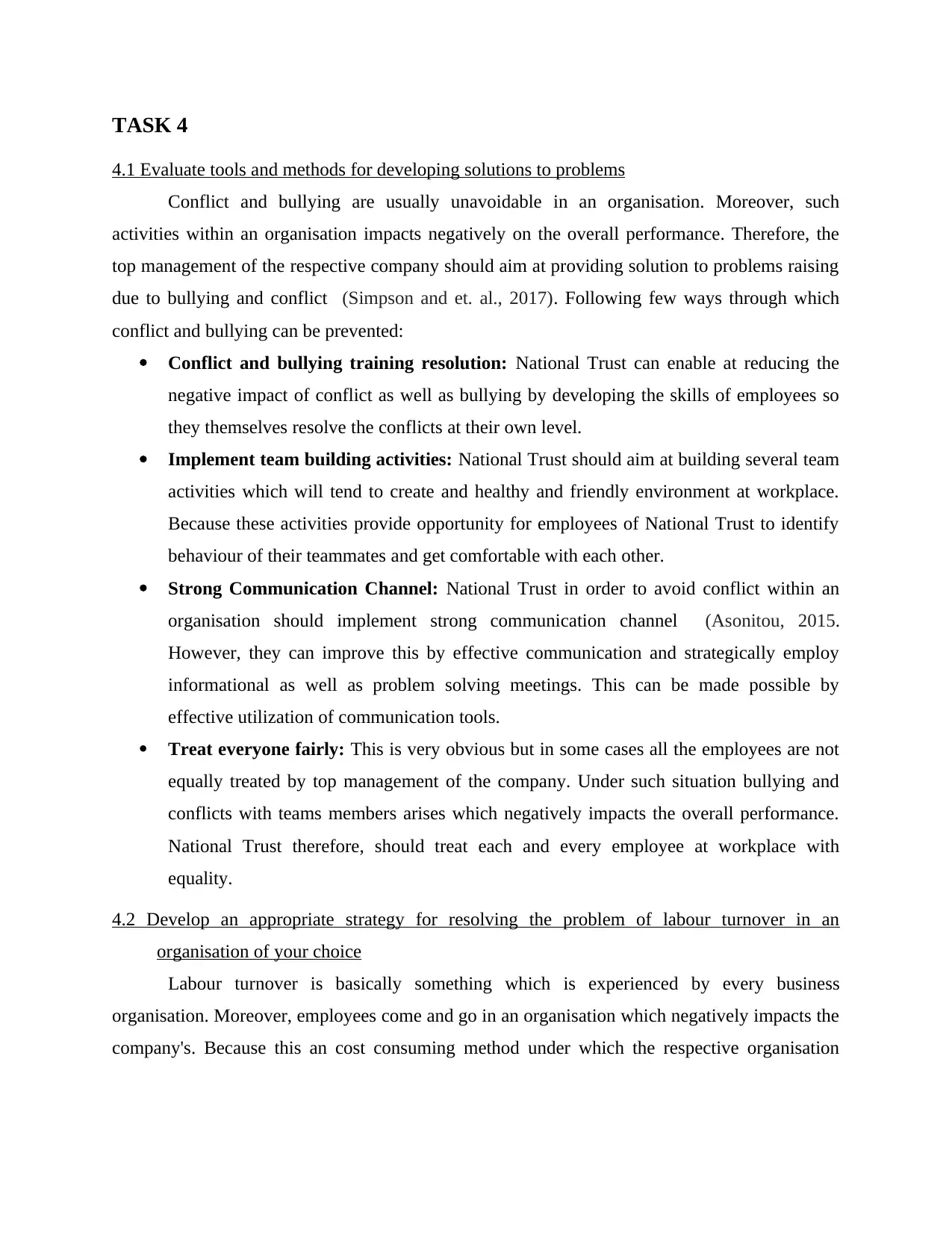
TASK 4
4.1 Evaluate tools and methods for developing solutions to problems
Conflict and bullying are usually unavoidable in an organisation. Moreover, such
activities within an organisation impacts negatively on the overall performance. Therefore, the
top management of the respective company should aim at providing solution to problems raising
due to bullying and conflict (Simpson and et. al., 2017). Following few ways through which
conflict and bullying can be prevented:
Conflict and bullying training resolution: National Trust can enable at reducing the
negative impact of conflict as well as bullying by developing the skills of employees so
they themselves resolve the conflicts at their own level.
Implement team building activities: National Trust should aim at building several team
activities which will tend to create and healthy and friendly environment at workplace.
Because these activities provide opportunity for employees of National Trust to identify
behaviour of their teammates and get comfortable with each other.
Strong Communication Channel: National Trust in order to avoid conflict within an
organisation should implement strong communication channel (Asonitou, 2015.
However, they can improve this by effective communication and strategically employ
informational as well as problem solving meetings. This can be made possible by
effective utilization of communication tools.
Treat everyone fairly: This is very obvious but in some cases all the employees are not
equally treated by top management of the company. Under such situation bullying and
conflicts with teams members arises which negatively impacts the overall performance.
National Trust therefore, should treat each and every employee at workplace with
equality.
4.2 Develop an appropriate strategy for resolving the problem of labour turnover in an
organisation of your choice
Labour turnover is basically something which is experienced by every business
organisation. Moreover, employees come and go in an organisation which negatively impacts the
company's. Because this an cost consuming method under which the respective organisation
4.1 Evaluate tools and methods for developing solutions to problems
Conflict and bullying are usually unavoidable in an organisation. Moreover, such
activities within an organisation impacts negatively on the overall performance. Therefore, the
top management of the respective company should aim at providing solution to problems raising
due to bullying and conflict (Simpson and et. al., 2017). Following few ways through which
conflict and bullying can be prevented:
Conflict and bullying training resolution: National Trust can enable at reducing the
negative impact of conflict as well as bullying by developing the skills of employees so
they themselves resolve the conflicts at their own level.
Implement team building activities: National Trust should aim at building several team
activities which will tend to create and healthy and friendly environment at workplace.
Because these activities provide opportunity for employees of National Trust to identify
behaviour of their teammates and get comfortable with each other.
Strong Communication Channel: National Trust in order to avoid conflict within an
organisation should implement strong communication channel (Asonitou, 2015.
However, they can improve this by effective communication and strategically employ
informational as well as problem solving meetings. This can be made possible by
effective utilization of communication tools.
Treat everyone fairly: This is very obvious but in some cases all the employees are not
equally treated by top management of the company. Under such situation bullying and
conflicts with teams members arises which negatively impacts the overall performance.
National Trust therefore, should treat each and every employee at workplace with
equality.
4.2 Develop an appropriate strategy for resolving the problem of labour turnover in an
organisation of your choice
Labour turnover is basically something which is experienced by every business
organisation. Moreover, employees come and go in an organisation which negatively impacts the
company's. Because this an cost consuming method under which the respective organisation
⊘ This is a preview!⊘
Do you want full access?
Subscribe today to unlock all pages.

Trusted by 1+ million students worldwide
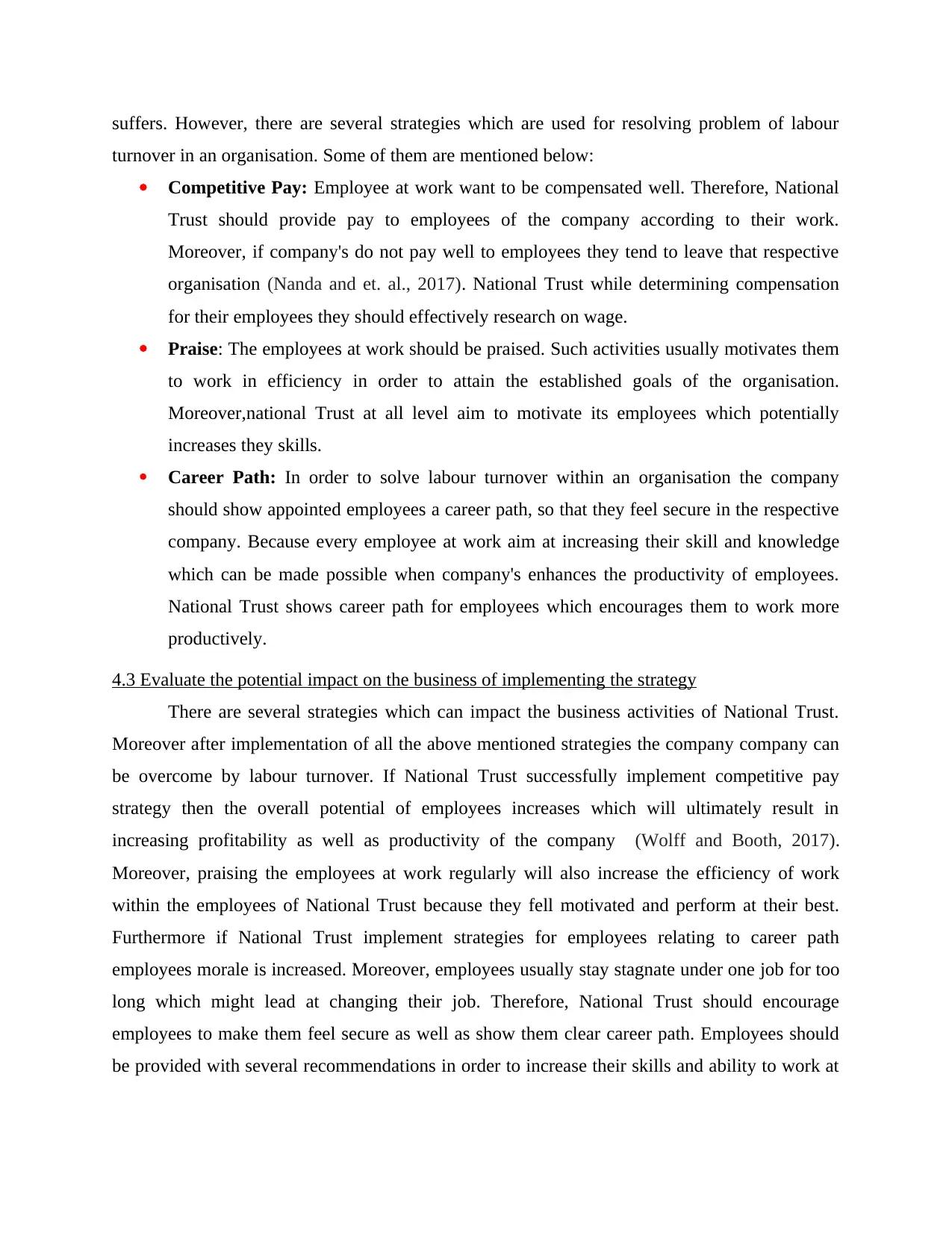
suffers. However, there are several strategies which are used for resolving problem of labour
turnover in an organisation. Some of them are mentioned below:
Competitive Pay: Employee at work want to be compensated well. Therefore, National
Trust should provide pay to employees of the company according to their work.
Moreover, if company's do not pay well to employees they tend to leave that respective
organisation (Nanda and et. al., 2017). National Trust while determining compensation
for their employees they should effectively research on wage.
Praise: The employees at work should be praised. Such activities usually motivates them
to work in efficiency in order to attain the established goals of the organisation.
Moreover,national Trust at all level aim to motivate its employees which potentially
increases they skills.
Career Path: In order to solve labour turnover within an organisation the company
should show appointed employees a career path, so that they feel secure in the respective
company. Because every employee at work aim at increasing their skill and knowledge
which can be made possible when company's enhances the productivity of employees.
National Trust shows career path for employees which encourages them to work more
productively.
4.3 Evaluate the potential impact on the business of implementing the strategy
There are several strategies which can impact the business activities of National Trust.
Moreover after implementation of all the above mentioned strategies the company company can
be overcome by labour turnover. If National Trust successfully implement competitive pay
strategy then the overall potential of employees increases which will ultimately result in
increasing profitability as well as productivity of the company (Wolff and Booth, 2017).
Moreover, praising the employees at work regularly will also increase the efficiency of work
within the employees of National Trust because they fell motivated and perform at their best.
Furthermore if National Trust implement strategies for employees relating to career path
employees morale is increased. Moreover, employees usually stay stagnate under one job for too
long which might lead at changing their job. Therefore, National Trust should encourage
employees to make them feel secure as well as show them clear career path. Employees should
be provided with several recommendations in order to increase their skills and ability to work at
turnover in an organisation. Some of them are mentioned below:
Competitive Pay: Employee at work want to be compensated well. Therefore, National
Trust should provide pay to employees of the company according to their work.
Moreover, if company's do not pay well to employees they tend to leave that respective
organisation (Nanda and et. al., 2017). National Trust while determining compensation
for their employees they should effectively research on wage.
Praise: The employees at work should be praised. Such activities usually motivates them
to work in efficiency in order to attain the established goals of the organisation.
Moreover,national Trust at all level aim to motivate its employees which potentially
increases they skills.
Career Path: In order to solve labour turnover within an organisation the company
should show appointed employees a career path, so that they feel secure in the respective
company. Because every employee at work aim at increasing their skill and knowledge
which can be made possible when company's enhances the productivity of employees.
National Trust shows career path for employees which encourages them to work more
productively.
4.3 Evaluate the potential impact on the business of implementing the strategy
There are several strategies which can impact the business activities of National Trust.
Moreover after implementation of all the above mentioned strategies the company company can
be overcome by labour turnover. If National Trust successfully implement competitive pay
strategy then the overall potential of employees increases which will ultimately result in
increasing profitability as well as productivity of the company (Wolff and Booth, 2017).
Moreover, praising the employees at work regularly will also increase the efficiency of work
within the employees of National Trust because they fell motivated and perform at their best.
Furthermore if National Trust implement strategies for employees relating to career path
employees morale is increased. Moreover, employees usually stay stagnate under one job for too
long which might lead at changing their job. Therefore, National Trust should encourage
employees to make them feel secure as well as show them clear career path. Employees should
be provided with several recommendations in order to increase their skills and ability to work at
Paraphrase This Document
Need a fresh take? Get an instant paraphrase of this document with our AI Paraphraser
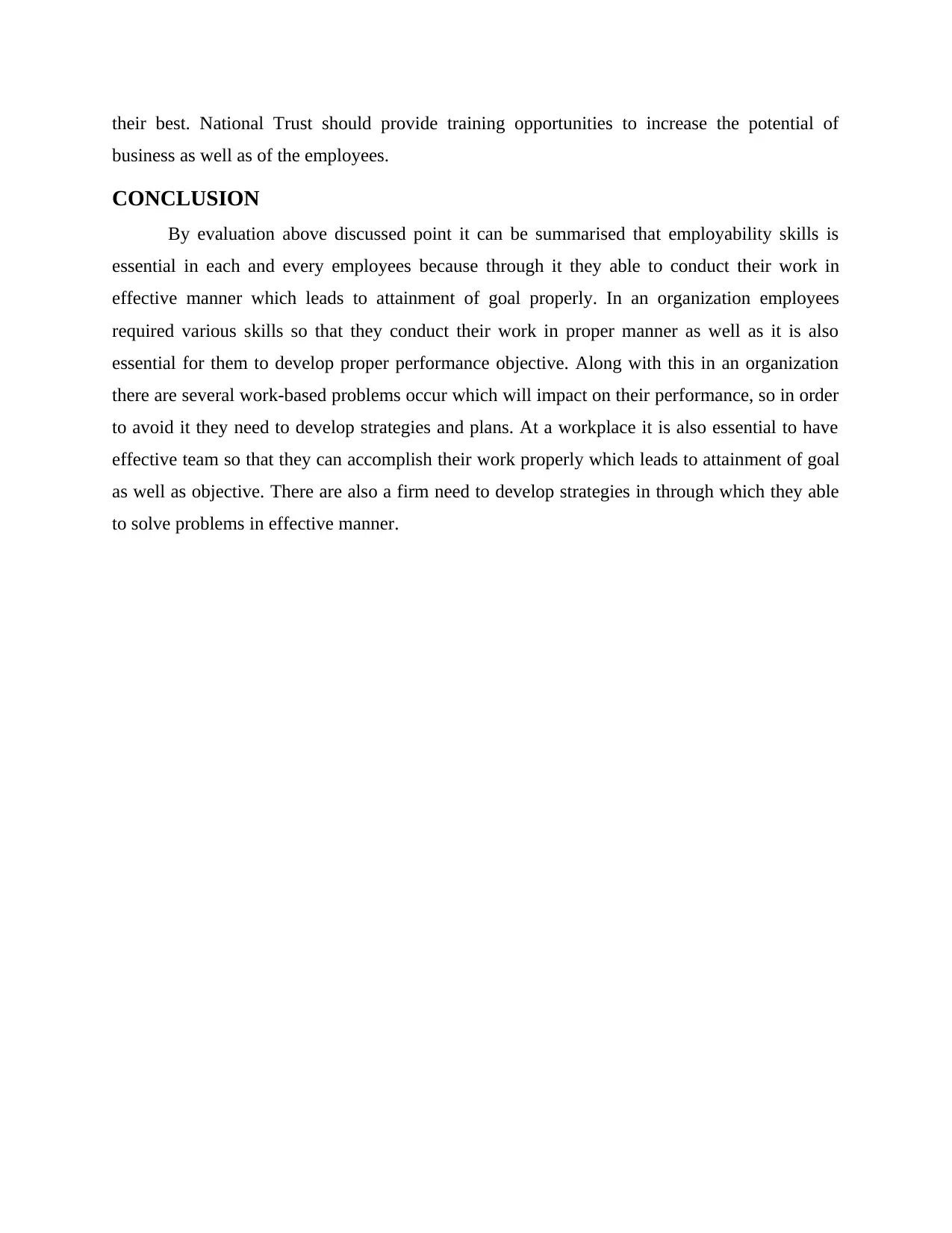
their best. National Trust should provide training opportunities to increase the potential of
business as well as of the employees.
CONCLUSION
By evaluation above discussed point it can be summarised that employability skills is
essential in each and every employees because through it they able to conduct their work in
effective manner which leads to attainment of goal properly. In an organization employees
required various skills so that they conduct their work in proper manner as well as it is also
essential for them to develop proper performance objective. Along with this in an organization
there are several work-based problems occur which will impact on their performance, so in order
to avoid it they need to develop strategies and plans. At a workplace it is also essential to have
effective team so that they can accomplish their work properly which leads to attainment of goal
as well as objective. There are also a firm need to develop strategies in through which they able
to solve problems in effective manner.
business as well as of the employees.
CONCLUSION
By evaluation above discussed point it can be summarised that employability skills is
essential in each and every employees because through it they able to conduct their work in
effective manner which leads to attainment of goal properly. In an organization employees
required various skills so that they conduct their work in proper manner as well as it is also
essential for them to develop proper performance objective. Along with this in an organization
there are several work-based problems occur which will impact on their performance, so in order
to avoid it they need to develop strategies and plans. At a workplace it is also essential to have
effective team so that they can accomplish their work properly which leads to attainment of goal
as well as objective. There are also a firm need to develop strategies in through which they able
to solve problems in effective manner.
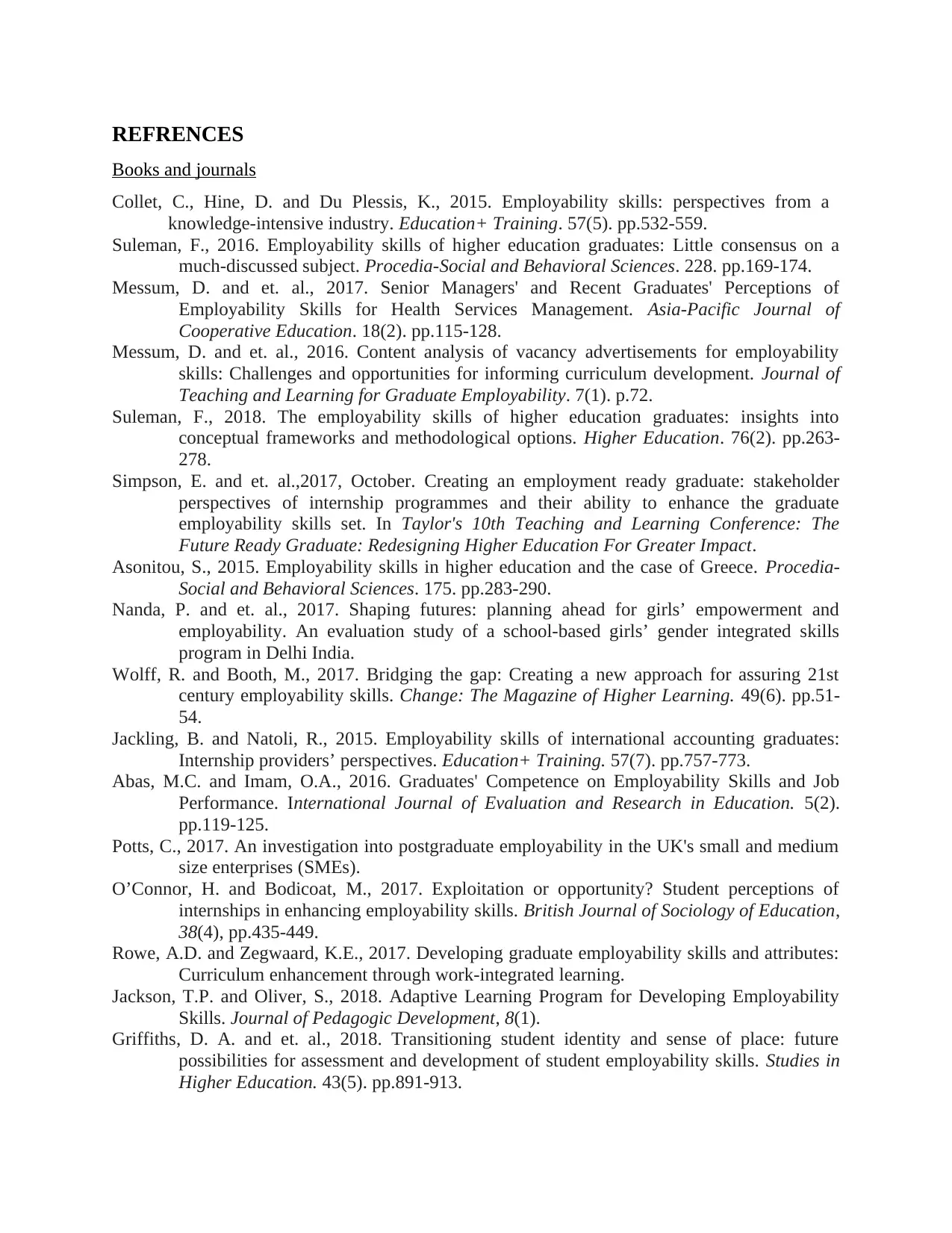
REFRENCES
Books and journals
Collet, C., Hine, D. and Du Plessis, K., 2015. Employability skills: perspectives from a
knowledge-intensive industry. Education+ Training. 57(5). pp.532-559.
Suleman, F., 2016. Employability skills of higher education graduates: Little consensus on a
much-discussed subject. Procedia-Social and Behavioral Sciences. 228. pp.169-174.
Messum, D. and et. al., 2017. Senior Managers' and Recent Graduates' Perceptions of
Employability Skills for Health Services Management. Asia-Pacific Journal of
Cooperative Education. 18(2). pp.115-128.
Messum, D. and et. al., 2016. Content analysis of vacancy advertisements for employability
skills: Challenges and opportunities for informing curriculum development. Journal of
Teaching and Learning for Graduate Employability. 7(1). p.72.
Suleman, F., 2018. The employability skills of higher education graduates: insights into
conceptual frameworks and methodological options. Higher Education. 76(2). pp.263-
278.
Simpson, E. and et. al.,2017, October. Creating an employment ready graduate: stakeholder
perspectives of internship programmes and their ability to enhance the graduate
employability skills set. In Taylor's 10th Teaching and Learning Conference: The
Future Ready Graduate: Redesigning Higher Education For Greater Impact.
Asonitou, S., 2015. Employability skills in higher education and the case of Greece. Procedia-
Social and Behavioral Sciences. 175. pp.283-290.
Nanda, P. and et. al., 2017. Shaping futures: planning ahead for girls’ empowerment and
employability. An evaluation study of a school-based girls’ gender integrated skills
program in Delhi India.
Wolff, R. and Booth, M., 2017. Bridging the gap: Creating a new approach for assuring 21st
century employability skills. Change: The Magazine of Higher Learning. 49(6). pp.51-
54.
Jackling, B. and Natoli, R., 2015. Employability skills of international accounting graduates:
Internship providers’ perspectives. Education+ Training. 57(7). pp.757-773.
Abas, M.C. and Imam, O.A., 2016. Graduates' Competence on Employability Skills and Job
Performance. International Journal of Evaluation and Research in Education. 5(2).
pp.119-125.
Potts, C., 2017. An investigation into postgraduate employability in the UK's small and medium
size enterprises (SMEs).
O’Connor, H. and Bodicoat, M., 2017. Exploitation or opportunity? Student perceptions of
internships in enhancing employability skills. British Journal of Sociology of Education,
38(4), pp.435-449.
Rowe, A.D. and Zegwaard, K.E., 2017. Developing graduate employability skills and attributes:
Curriculum enhancement through work-integrated learning.
Jackson, T.P. and Oliver, S., 2018. Adaptive Learning Program for Developing Employability
Skills. Journal of Pedagogic Development, 8(1).
Griffiths, D. A. and et. al., 2018. Transitioning student identity and sense of place: future
possibilities for assessment and development of student employability skills. Studies in
Higher Education. 43(5). pp.891-913.
Books and journals
Collet, C., Hine, D. and Du Plessis, K., 2015. Employability skills: perspectives from a
knowledge-intensive industry. Education+ Training. 57(5). pp.532-559.
Suleman, F., 2016. Employability skills of higher education graduates: Little consensus on a
much-discussed subject. Procedia-Social and Behavioral Sciences. 228. pp.169-174.
Messum, D. and et. al., 2017. Senior Managers' and Recent Graduates' Perceptions of
Employability Skills for Health Services Management. Asia-Pacific Journal of
Cooperative Education. 18(2). pp.115-128.
Messum, D. and et. al., 2016. Content analysis of vacancy advertisements for employability
skills: Challenges and opportunities for informing curriculum development. Journal of
Teaching and Learning for Graduate Employability. 7(1). p.72.
Suleman, F., 2018. The employability skills of higher education graduates: insights into
conceptual frameworks and methodological options. Higher Education. 76(2). pp.263-
278.
Simpson, E. and et. al.,2017, October. Creating an employment ready graduate: stakeholder
perspectives of internship programmes and their ability to enhance the graduate
employability skills set. In Taylor's 10th Teaching and Learning Conference: The
Future Ready Graduate: Redesigning Higher Education For Greater Impact.
Asonitou, S., 2015. Employability skills in higher education and the case of Greece. Procedia-
Social and Behavioral Sciences. 175. pp.283-290.
Nanda, P. and et. al., 2017. Shaping futures: planning ahead for girls’ empowerment and
employability. An evaluation study of a school-based girls’ gender integrated skills
program in Delhi India.
Wolff, R. and Booth, M., 2017. Bridging the gap: Creating a new approach for assuring 21st
century employability skills. Change: The Magazine of Higher Learning. 49(6). pp.51-
54.
Jackling, B. and Natoli, R., 2015. Employability skills of international accounting graduates:
Internship providers’ perspectives. Education+ Training. 57(7). pp.757-773.
Abas, M.C. and Imam, O.A., 2016. Graduates' Competence on Employability Skills and Job
Performance. International Journal of Evaluation and Research in Education. 5(2).
pp.119-125.
Potts, C., 2017. An investigation into postgraduate employability in the UK's small and medium
size enterprises (SMEs).
O’Connor, H. and Bodicoat, M., 2017. Exploitation or opportunity? Student perceptions of
internships in enhancing employability skills. British Journal of Sociology of Education,
38(4), pp.435-449.
Rowe, A.D. and Zegwaard, K.E., 2017. Developing graduate employability skills and attributes:
Curriculum enhancement through work-integrated learning.
Jackson, T.P. and Oliver, S., 2018. Adaptive Learning Program for Developing Employability
Skills. Journal of Pedagogic Development, 8(1).
Griffiths, D. A. and et. al., 2018. Transitioning student identity and sense of place: future
possibilities for assessment and development of student employability skills. Studies in
Higher Education. 43(5). pp.891-913.
⊘ This is a preview!⊘
Do you want full access?
Subscribe today to unlock all pages.

Trusted by 1+ million students worldwide
1 out of 13
Related Documents
Your All-in-One AI-Powered Toolkit for Academic Success.
+13062052269
info@desklib.com
Available 24*7 on WhatsApp / Email
![[object Object]](/_next/static/media/star-bottom.7253800d.svg)
Unlock your academic potential
Copyright © 2020–2025 A2Z Services. All Rights Reserved. Developed and managed by ZUCOL.


